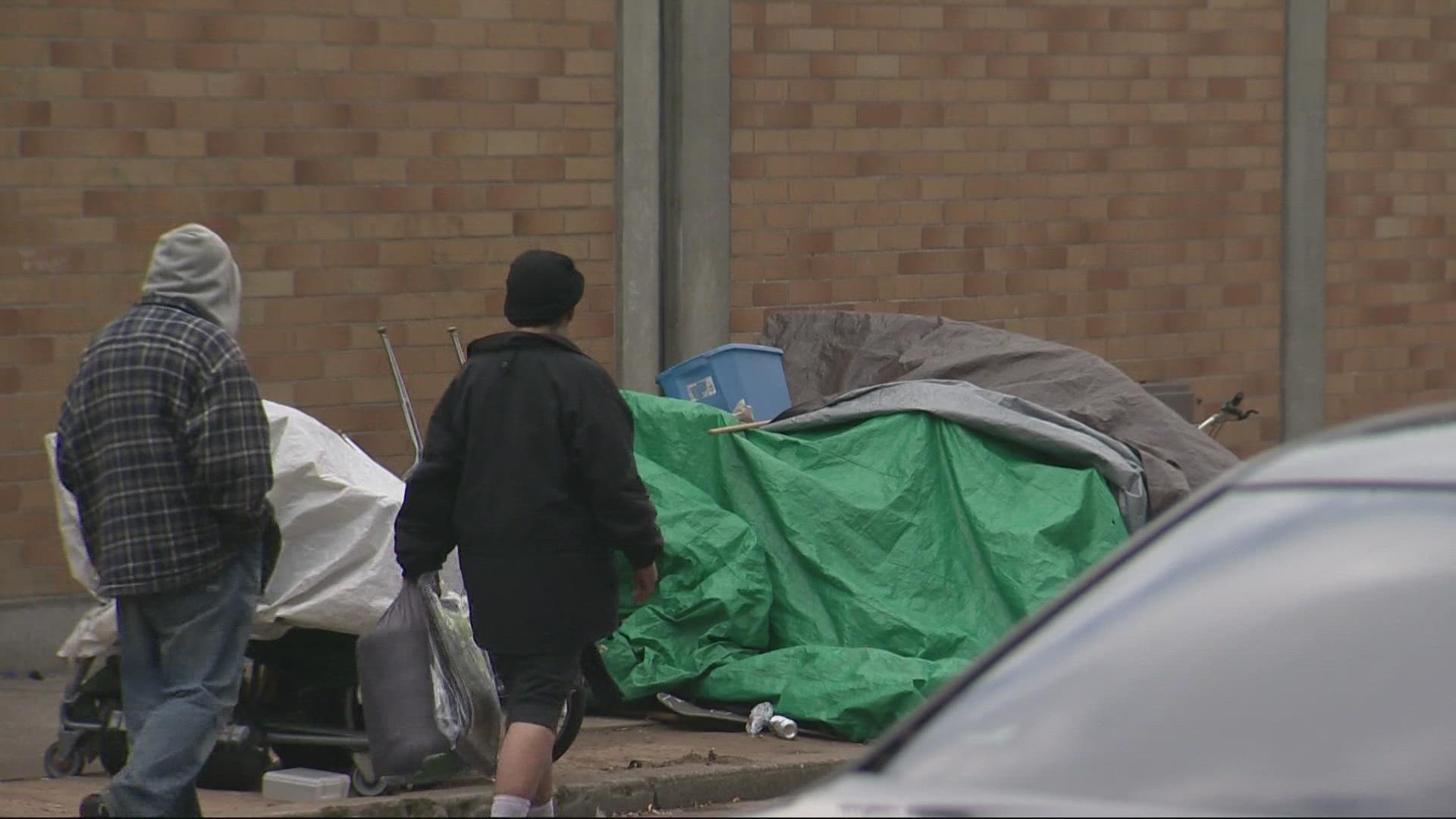PORTLAND, Ore. — Portland Mayor Ted Wheeler's office sent a memo to other local and state government officials last week outlining a plan to create up to three 1,000-person homeless shelters to end unsanctioned camping in the city.
The eight-page memo was written by former Portland mayor and current Wheeler advisor Sam Adams, and appears to have been sent to officials at Metro, Multnomah County and Oregon Gov. Kate Brown's office ahead of a Jan. 31 meeting between staff from the four governments.
"I understand my suggestions are big ideas," Adams wrote. "I imagine it will startle some."
Willamette Week and The Oregonian/OregonLive reported the existence of the memo Friday afternoon.
The plan's primary goals would be to create shelter space for 3,000 homeless residents, hold face-to-face meetings with every unhoused Portlander who has lived in the city for at least a year to offer them shelter, "end the need for unsanctioned houseless camps in Portland" and clean up public spaces.
The memo sets a target of June 1 to launch the program, with a project timespan of three years. The four governments would need to coordinate and use available executive or emergency powers to enact elements of the plan, according to the memo.
"Our work so far, mine included, has been failed to produce the sought-after results," Adams wrote.
The tone of the memo suggests a preliminary proposal rather than a fully-baked plan, with Adams writing near the top that his intent is to "offer some ideas and contextual observations on which they are derived." A Metro spokesperson told KGW that the memo "appeared to be a discussion draft," so the agency did not take any action on the proposal.
Adams declined a request for an interview on Friday.
The plan drew criticism from some members of the Portland City Council on Friday afternoon. Commissioner Carmen Rubio tweeted a link to the Willamette Week story, which reported that she had not previously been aware of the memo and quoted her as saying "'That idea would never fly with us—and if true, I hope that would be a non-starter for the mayor."
Commissioner Jo Ann Hardesty later tweeted that she agreed with Rubio, and wrote "based on what has been reported, this half-baked plan is a non-starter."
Commissioner Dan Ryan wrote an email to Mayor Wheeler that said he had "grave concerns with the concept of creating high-population outdoor camping zones."
"I believe that the creation of these zones would quickly lead to extremely detrimental outcomes for people experiencing houselessness," he wrote. "These are our most vulnerable community members, and requiring them to move out of certain parts of the city and into large encampments with little to no social services is a recipe for disaster. Instances of human trafficking, widespread drug distribution, and various other illicit and highly harmful activities would almost certainly occur at much greater rates among such a large, concentrated population."
The plan would create up to three shelters with a combined 3,000-person capacity, referred to in the memo as Houseless Service Centers. They would be staffed in part by unarmed Oregon National Guard security specialists, medical corps and Portland State University social work graduate students.
The sites would be located near MAX or bus stations, Adams wrote, using city-owned land or eminent domain for privately owned land.
The plan would include a "phased-in no camping approach," to reach a point where the city prohibits all unsanctioned camping, according to the memo.
It also calls for Wheeler, Brown and the county to ask for federal recognition of a "houselessness disaster" and invite other west coast cities and states to make simultaneous requests to the Federal Emergency Management Agency to declare houselessness a federal emergency and eligible for federal funds.
Adams mentions in the memo that Portland received 78,573 houselessness-related complaints and requests for services in 2021, relating to 250 observed active encampments.
The city has quadrupled its houselessness-related cleanup budget in the past two years, he wrote, but existing encampments have taken longer to remove during the pandemic, resulting in fewer camp sites cleaned up per week last year than in prior years.
Read the full memo:
News of the proposal comes about a week after Wheeler enacted an emergency declaration to prohibit camping along freeways and high-crash streets in Portland, citing a report that 70% of pedestrians killed in Portland traffic incidents last year were homeless.
One day later, Wheeler and Commissioner Ryan jointly announced a separate ban on camping within 150 feet of Safe Rest Village sites in order to create "buffer zones."
The Safe Rest Villages are a planned set of six organized shelter sites for homeless residents that would provide residents with individual shelters and access to support and services.
Ryan announced the plan in June with the goal of getting the villages up and running by the end of 2021, but only three locations have been announced so far and none of them have opened.
The Adams memo briefly references the Safe Rest Villages, saying that their use would be coordinated with the Houseless Service Centers.

